2015ACCA《F4公司法与商法》辅导讲义(2)
ACCA考试《F4公司法与商法》辅导要点二

ACCA考试《F4公司法与商法》辅导要点二本文由高顿ACCA整理发布,转载请注明出处Articles of association1 Introduction1.1 Articles are concerned with internal regulations of a company.Table A contains the specimen format.Table A applies unless excluded expressly or by implication.2 Legal effect of the articlesThe articles constitute a contract between (S14 CA 1985):2.1 (a) Members and the companyHickman v. Kent or Romney Marsh Sheepbreeders Assoc.(b) The company and membersPender v. Lushington(c) The members inter seBorland's Trustee v Steel Bros. Ltd.The articles do not constitute a contract between:2.2 The company and third parties: Eley v. Positive Life Co.2.3 If someone has dual capacity the courts will distinguish between a person’s membership/non-membership rights and/or duties.3 Alteration of the articlesBasic rules3.1 S.9 The articles may be altered by a special resolution. The basic test is whether the alteration is for the benefit of the company as a whole. Greenhalgh v Arderne Cinemas.3.2 The change cannot be prevented by declaring the articles/a clause to be unalterable.3.3 No outside contract will prevent a change but the company may be liable for breach of contract. Southern Foundries v Shirlaw.Case law3.4 (a) Most alterations are allowed by the court. An alteration will not be prevented simply because it inflicts hardship on some members but not on others. Greenhalgh v. Arderne Cinemas(b) Alterations which give the company the power to expel members are viewed with considerable suspicion. Dafen Tinplate Co. v. Llanelly Steel Co.(c) However, such alterations will be allowed if the proposed clause is carefully worded, eg where a member is:(i) competing with the company. Sidebottom v. Kershaw Leese & Co. Ltd.(ii) defrauding the company. Shuttleworth v. Cox Brothers Ltd.3.5 Alterations can be prevented by 'weighted voting rights' Bushell v Faith.更多ACCA资讯请关注高顿ACCA官网:。
公司法(2015版本)

• 法人是与自然人并列的一类民商事主体,具有独立的主体性资格, 具有法律主体所要求的权利能力和行为能力,能够以自己的名义从事 民商事活动并以自己的财产独立承担民事责任。公司是最典型的法人 类型,体现了法人的最本质特征。
传统的大陆法系的法 人分类
社团法人 如:公司 财团法人 如:基金会、红十字会
• E、母公司最基本特征,不在于是否持有子公司股份,而在于是 否参与子公司业务经营。母公司不需要持半数以上股份。
母公司与子公司 总公司与分公司
A母公司 5000万元
B子公司 200万元
欠500万元
D公司
欠500万元
C分公司
D公司
200万元 问:B、C应如何清偿D公司的债务呢?为什么?
• 3、以股东的责任范围为标准:
• 行业或经营特点:公司名称中应标明公司业务范围的 主营行业,如“抽水蓄能”“服装”“电子”“制药”等 等。
• 组织形式:《公司法》规定:依照本法设立的有限责 任公司,必须在公司名称中标明有限责任公司或者有限公 司字样。
第一节 公司法概述
• 公司只准使用一个名称,公司名称具有唯一性。 • 公司印章、银行账户、牌匾、信笺使用的名称应与登 记注册的企业名称相同。 • 公司名称可以随企业或者企业的一部分一并转让。 • 公司名称发生争议,按申请在先的原则处理。谁先申 请名称登记注册,谁享有企业名称权。
• 4、以股份的转让方式为标准
• 分为封闭式公司和开放式公司。
• 封闭式公司是指股份全部由设立该公司的一定人数的 股东持有,不能对外公开发行股份。
• 开放式公司是指可以公开招股,股东人数无最高数额 限制,其股票可以在证券市场公开交易的公司。
• 有限责任公司属于封闭式公司。因为具有强烈的人合 性
ACCAF4公司法与商法知识点讲解(4)

ACCA F4《公司法与商法》知识点讲解(4)1 Human Rights ACT 19981.1 The Human Rights Act imposes a duty in "public authorities" to comply with the European Convention on Human Rights, and allows us to take action in the UK courts for violations of Convention rights.1.2 Prior to the Act conventions rights could only be enforced in the European Court of Human Rights in Strasbourg which could be time consuming, expensive and daunting.1.3 Now that the convention is part of UK law (HRA98) those rights can now be enforced in UK courts.2 The rights (articles)2.1 The main rights are:2.1.1 the right to life (A.2)2.1.2 prohibition of torture (A.3)2.1.3 no slavery or forced labour (A.4)2.1.4 right to liberty and security (A.5)2.1.5 right to a fair trial (A.6)2.1.6 no punishment without law (A.7) (generally therefore criminal offences should not be retrospective)2.1.7 right to respect for privacy, family life (A.8)2.1.8 freedom of thought, conscience and religion (A.9)2.1.9 freedom of expression, assembly and association (A.10/A.11)right to marry (A.12)no discrimination in rights (A.14)right to free elections.(Note that the Articles are set out in full in your Study Text).3 Impact on interpretation of statutes3.1 As a 'public authority' the courts are required to construe legislation so that – as far as possible – it is compatible with the rights contained within the convention and apply existing common law in a manner that is compatible with convention rights. S2 of the Act requires future courts to take account of previous decisions of the ECHR.If reconciliation with an Act of Parliament is not possible the existing legislation prevails although that may trigger a fast track procedure in the Act requiring Parliament to change existing laws. In such circumstances the court issues a declaration of incompatibility, it is then for the legislature to remedy the situation through new legislation. If the fast track procedure is used this gives ministers the power to alter incompatible parts of any primary legislation by way of statutory instrument.If a court cannot reconcile 'delegated' legislation with the convention it can decide that the legislation does not apply.It may no longer be appropriate for the courts to follow some precedents on the interpretation of statutes which pre date the Act. These may now be reviewed in light of the Act.4 Impact on new legislation4.1 Before the Second Reading of the Bill the Minister responsible must make a statement either that the legislation is compatible with Convention rights, or such a statement cannot be made but the government still wants to proceed. Not all of the Articles can be derogated from. Articles 2,3,4,7 and 14 are absolute rights and cannot be interfered with. In exercising the right of derogation however the member state must be both convinced of the need for derogation and that the response is proportionate to any perceived problem.5 Impact on public authorities5.1 Public authorities are Courts and tribunals and any other person whose functions are of a public nature eg Registrar of Companies and government departments such as the DTI.5.2 It is unlawful for public authorities to act in a way which is incompatible with a convention right. A person who considers he has beena victim of an unlawful act by that authority may bring proceedings within12 months of the act occurring.5.3 The court has power to do as it thinks fit.6 European Court of Human Rights (ECHR)6.1 The final source of appeal (after the House of Lords) on human rights issues is the European Court of Human Rights. There is no appeal from the European Court of Human Rights to the European Court of Justice. Decisions of the ECHR must be taken into account when deciding interpretation.NB. Note that new cases on the HRA98 are being decided all the time. The examiner plans to write an article to consider these cases. Keep checking your student accountant for developments.7 Examinability of HRA 98This is an area that the examiner has expressed to be important so be aware of developments that may be referred to in the press.Make sure that you have an appreciation of how HRA 98 may impact on other syllabus areas. For example:。
ACCA《F4公司法与商法》精选讲义第一章(1)

ACCA《F4公司法与商法》精选讲义第一章(1)本文由高顿ACCA整理发布,转载请注明出处Session 1 The Nature, Source and Purpose of Management AccountingMain contents:1. Data and information2. The managerial processes of planning, decision making and control3. Responsibility accounting4. Management accounting and financing accounting5. Presentation of management information1.1 Data and Information· Data consists of raw materials, which include numbers, letters, symbols, facts, events and transactions, that have been recorded but not yet processed into a form suitable for use.· Information is data which has been processed in such a way that it is meaningful to the person to the person who receives it. (for decision making purpose)The attributes of good information can be identified by the “ACCURATE” as shown below:· Accurate: accurate enough for the purpose· Complete: all the necessary information· Cost- effective: benefit > costs· Understandable: clear and easy to understand· Relevant: relevant to purpose· Accessible: the best way to communicate with the related person· Timely: be available at the right time· Easy to use: by management1.2 The Managerial Process of Planning , Decision Making and ControlInformation for management is likely to be used for planning, control and decision making objectives:An objective is the aim or goal of an organization. A strategy is a possible course of action that might enable an organization or an individual to achieve its objective.Planning:· Planning involved the following two factors:Establishing the objectivesSelecting appropriate strategy to achieve those objectives· The link between structure and strategy (understanding)1)。
ACCA-F4知识要点汇总(精简版)

ACCA-F4知识要点汇总(精简版)1. 公司法律结构及管理公司的法律结构包括公司章程、股东协议、公司登记簿、董事会、股东大会、公司秘书等。
管理层需要遵守法律法规,同时也应该关注公司的社会责任和企业道德。
2. 公司财务及税务公司的财务部门需要负责编制财务报表、管理公司资金、进行预算和决策分析等。
税务部门需要负责申报税务、缴纳税款以及规划税务策略。
3. 合同法律框架合同是商业交易的基础,具有法律约束力。
合同的成立需要满足合同要素、合同内容的充分和明确、合同手续正确等条件。
合同的违约应该依法承担相应的法律责任。
4. 卖方和买方的权利与义务在商品的交易中,卖方需要履行交货、履行义务、提供货物信息等职责;买方需要履行付款、接收货物、检验货物、通知卖方等职责。
同时,卖方和买方也有权利保护自己的利益。
5. 银行融资银行融资是常见的企业融资方式,包括贷款、信用证、保函等。
企业在申请银行融资时需提供充分的资料和合理的担保措施,并在合同履行期内按期还款。
6. 国际贸易国际贸易的主体包括进出口商、代理商、货代、保险公司等。
在国际贸易中,涉及到的问题有贸易商信用、运输保险、海关手续等。
企业需要制定适应国际贸易的商业策略。
7. 合并与收购合并与收购是企业快速扩张的一种方式。
在进行合并与收购时,需要考虑战略目标、财务风险、员工合法权益等问题,并进行充分的财务、法律尽职调查。
8. 会计和审计会计和审计是公司财务管理的重要组成部分。
会计部门需要负责制定会计政策、编制财务报表等。
审计部门需要进行内部审核、外部审核等工作,并对财务报表的真实性和准确性进行评估。
ACCA F4《公司法与商法》知识点讲解(2)
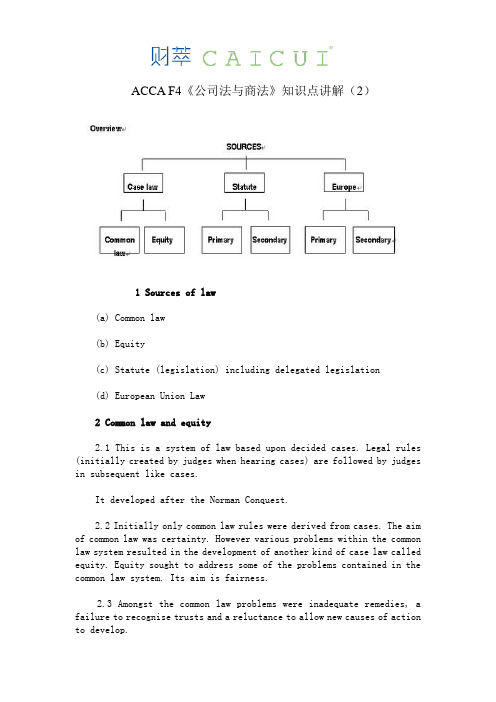
ACCA F4《公司法与商法》知识点讲解(2)1 Sources of law(a) Common law(b) Equity(c) Statute (legislation) including delegated legislation(d) European Union Law2 Common law and equity2.1 This is a system of law based upon decided cases. Legal rules (initially created by judges when hearing cases) are followed by judges in subsequent like cases.It developed after the Norman Conquest.2.2 Initially only common law rules were derived from cases. The aim of common law was certainty. However various problems within the common law system resulted in the development of another kind of case law called equity. Equity sought to address some of the problems contained in the common law system. Its aim is fairness.2.3 Amongst the common law problems were inadequate remedies, a failure to recognise trusts and a reluctance to allow new causes of action to develop.2.4 At first common law and equity operated as two distinct systems of law with their own independent court and judges. Given that equity is based on fairness however it was eventually decided that in the event of conflict between the two systems equity should prevail.2.5 The two systems have now been merged together. In practice therefore, if you seek a remedy in the courts today, the court will look first to the common law. If the common law can deal with your problem adequately there will be no recourse to equity. If the common law is unable to deal adequately with the problem the court will look to equity.2.6 Equity is therefore referred to as to a supplement to the common law.2.7 The operation of equity is entirely discretionary whereas common law applies automatically.2.8 Maxims:'He who comes to equity must come with clean hands.''Equity does not suffer a wrong to be without a remedy.'。
ACCA《F4公司法与商法》精选讲义第一章(2)
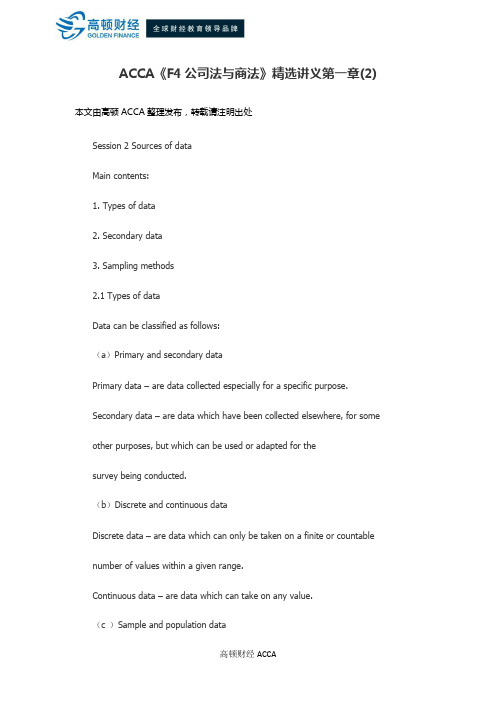
ACCA《F4公司法与商法》精选讲义第一章(2)本文由高顿ACCA整理发布,转载请注明出处Session 2 Sources of dataMain contents:1. Types of data2. Secondary data3. Sampling methods2.1 Types of dataData can be classified as follows:(a)Primary and secondary dataPrimary data – are data collected especially for a specific purpose.Secondary data – are data which have been collected elsewhere, for some other purposes, but which can be used or adapted for thesurvey being conducted.(b)Discrete and continuous dataDiscrete data – are data which can only be taken on a finite or countable number of values within a given range.Continuous data – are data which can take on any value.(c )Sample and population dataSample data – are data arising as a result of investigating a samplePopulation data – are data arising as a result of investigating the population.2.2 Secondary dataThe main sources of secondary data are: governments; banks; newspaper; trade journals; information bureau; consultancies; libraries and information services.- It is essential to believe that the secondary data used is accurate and reliable.2.3 Sampling methodsData are often collected from a sample rather than from a population. If the whole population is examined, the survey is called a census.There are two types of sampling methods:Probability sampling method – is a sampling method in which there is a known chance of each member of the population appearing in the sample.- Random- Stratified random- Systematic- Multistage- ClusterIf random sampling is used, it is necessary to construct a sampling frame.A sampling frame should have following characteristics- completeness- accuracy- adequacy- up to dateness- convenience- non-duplicationNon probability sampling method – is a sampling method in which the chance of each member of the population appearing in the sample is not know, i.e. quota sampling.Example 1:The following statements relate to which different types of data(i)。
2015年ACCAF4公司法和商法考试大纲
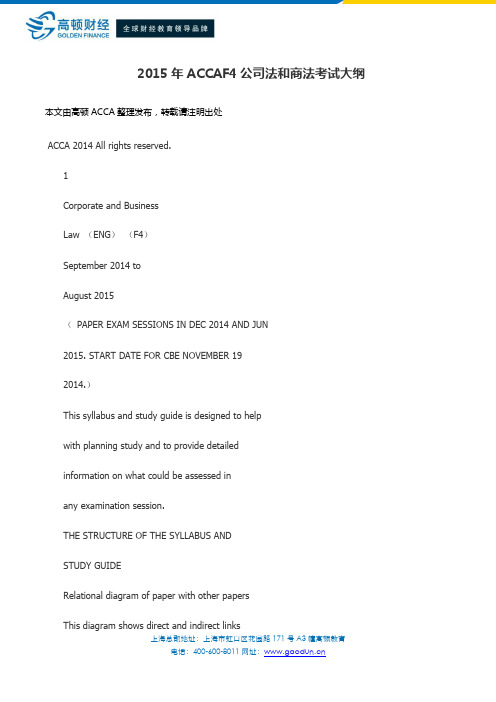
2015年ACCAF4公司法和商法考试大纲本文由高顿ACCA整理发布,转载请注明出处ACCA 2014 All rights reserved.1Corporate and BusinessLaw (ENG)(F4)September 2014 toAugust 2015(PAPER EXAM SESSIONS IN DEC 2014 AND JUN2015. START DATE FOR CBE NOVEMBER 192014.)This syllabus and study guide is designed to helpwith planning study and to provide detailedinformation on what could be assessed inany examination session.THE STRUCTURE OF THE SYLLABUS ANDSTUDY GUIDERelational diagram of paper with other papersThis diagram shows direct and indirect linksbetween this paper and other papers preceding or following it. Some papers are directly underpinned by other papers such as Advanced Performance Management by Performance Management. These links are shown as solid line arrows. Other papers only have indirect relationships with each other such as links existing between the accounting and auditing papers. The links between these are shown as dotted line arrows. This diagram indicates where you are expected to have underpinning knowledge and where it would be useful to review previous learning before undertaking study.Overall aim of the syllabusThis explains briefly the overall objective of the paper and indicates in the broadest sense the capabilities to be developed within the paper.Main capabilitiesThis pap er’s aim is broken down into several main capabilities which divide the syllabus and studyguide into discrete sections.Relational diagram of the main capabilitiesThis diagram illustrates the flows and links between the main capabilities (sections)of the syllabus and should be used as an aid to planning teaching and learning in a structured way.Syllabus rationaleThis is a narrative explaining how the syllabus is structured and how the main capabilities are linked. The rationale also explains in further detail what the examination intends to assess and why.Detailed syllabusThis shows the breakdown of the main capabilities (sections)of the syllabus into subject areas. This is the blueprint for the detailed study guide.Approach to examining the syllabusThis section briefly explains the structure of the examination and how it is assessed.Study GuideThis is the main document that students, learning and content providers should use as the basis of their studies, instruction and materials. Examinations will be based on the detail of the study guide which comprehensively identifies what could be assessed in any examination session.The study guide is a precise reflection and breakdown of the syllabus. It is divided into sections based on the main capabilities identified in the syllabus. These sections are divided into subject areas which relate to the sub-capabilities includedin the detailed syllabus. Subject areas are broken down into sub-headings which describe the detailed outcomes that could be assessed in examinations. These outcomes are described using verbs indicating what exams may require students to demonstrate, and the broad intellectual level at which these may need to be demonstrated(*see intellectual levels below)。
ACCAF4公司法和商法考试大纲

ACCAF4公司法和商法考试大纲 ACCA All rights reserved.1Corporate and BusinessLaw (ENG)(F4)September 2014 toAugust 2015(PAPER EXAM SESSIONS IN DEC 2014 AND JUN2015. START DATE FOR CBE NOVEMBER 192014.)This syllabus and study guide is designed to helpwith planning study and to provide detailedinformation on what could be assessed inany examination session.THE STRUCTURE OF THE SYLLABUS ANDSTUDY GUIDERelational diagram of paper with other papersThis diagram shows direct and indirect linksbetween this paper and other papers preceding orfollowing it. Some papers are directly underpinned by other papers such as Advanced Performance Management by Performance Management. These links are shown as solid line arrows. Other papers only have indirect relationships with each other such as links existing between the accounting and auditing papers. The links between these are shown as dotted line arrows. This diagram indicates where you are expected to have underpinning knowledge and where it would be useful to review previous learning before undertaking study.Overall aim of the syllabusThis explains briefly the overall objective of the paper and indicates in the broadest sense the capabilities to be developed within the paper.Main capabilitiesThis paper’s aim is broken down into several main capabilities which divide the syllabus and study guide into discrete sections.Relational diagram of the main capabilitiesThis diagram illustrates the flows and links between the main capabilities (sections)of the syllabus and should be used as an aid to planning teaching and learning in a structured way.Syllabus rationaleThis is a narrative explaining how the syllabus is structured and how the main capabilities are linked. The rationale also explains in further detail what the examination intends to assess and why.Detailed syllabusThis shows the breakdown of the main capabilities (sections)of the syllabus into subject areas. This is the blueprint for the detailed study guide.Approach to examining the syllabusThis section briefly explains the structure of the examination and how it is assessed.Study GuideThis is the main document that students, learningand content providers should use as the basis of their studies, instruction and materials. Examinations will be based on the detail of the study guide which comprehensively identifies what could be assessed in any examination session.The study guide is a precise reflection and breakdown of the syllabus. It is divided into sections based on the main capabilities identified in the syllabus. These sections are divided into subject areas which relate to the sub-capabilities includedin the detailed syllabus. Subject areas are broken down into sub-headings which describe the detailed outcomes that could be assessed in examinations. These outcomes are described using verbs indicating what exams may require students to demonstrate, and the broad intellectual level at which these may need to be demonstrated(*see intellectual levels below)。
ACCA《F4公司法与商法》内容解析

ACCA《F4公司法与商法》内容解析本文由高顿ACCA整理发布,转载请注明出处Session 3 Types of cost and cost behaviorMain contents:1. Classifying costs2. Cost objects, cost and cost centers3. Analysis of costs into fixed and variable elements3.1 Classifying costsCosts can be classified in a number of different ways:· Element – costs are classified as materials, labor or expenses (overheads)· Nature – costs are classified as being direct or indirect.a. Direct cost is expenditure that can be directly identified with a specific cost unit or cost center.(1)。
Direct material is all material becoming part of the product unless used in negligible amount and/or having negligible cost. (component parts, part finished work and primary packing material)(2)。
Direct wages – are wages paid for labor either as basic hours or as overtime expensed on the product line.(3)。
ACCA F4《公司法与商法》知识点讲解(3)

ACCA F4《公司法与商法》知识点讲解(3)1 Doctrine of judicial precedent1.1 Common law and equity are a body of judge-made laws contained in decisions of the courts called judgements.1.2 Judge – made law or case law is whereby judges follow the decisions of other judges. The doctrine of precedent is sometimes referred to as 'stare decisis': let the decision stand.1.3 For case law to be workable as a source of law it needs to achieve consistency. Various 'rules' have therefore developed to achieve this aim.1.4 ‘Rules’:1.4.1 Only statements of law made by judges can form precedent. In turn these statements must be divided up into ratio decidendi (the reason for the decision) and obiter dicta (other comments).Only the ratio decidendi forms the basis of precedent as it is this reasoning which is vital to his decision. Obiter dicta are statements of general law (or hypothetical situations) which are not necessary for the decision in the case and hence are not binding.1.4.2 As the ratio decidendi of a case stems from specific facts ifa precedent is to be followed in a subsequent case the facts of that case must be sufficiently similar.1.4.3 The precedent must have been set by a court capable of creating precedent and not have been overruled.1.5 Hierarchy of the courts:(a) House of Lords – binds all lower courts but not itself (exceptional cases)(b) Court of Appeal – binds all lower courts and itself(c) High CourtJudge sitting alone – binds all lower courts not divisional courtsJudges sitting together – binds all lower courts and divisional courts(d) CrownMagistrates – bind no-one at allCounty1.6 A precedent ceases to be binding if:(i) It has been overruled by statute or EU law or by a higher court.(ii) It can be distinguished on the facts i.e. if the material facts are not the same.1.7 Advantages:(i) Detail.(ii) Flexibility.(iii) Consistency.(iv) Fairness.1.8 Disadvantages:(i) Bulk.(ii) Restricts judicial discretion.(iii) reactive system.(iv) Lack of democratic accountability.1.9 Persuasive authority:These are decisions (e.g. those of commonwealth countries, inferior courts and obiter dicta) which are not binding but may influence the decisions of judges in future cases.。
ACCAF4知识点总结

ACCAF4知识点总结ACCA F4(全称为Corporate and Business Law,企业与商法)是ACCA(特许公认会计师协会)的考试科目之一,该科目旨在培养学生对法律和道德标准在商业环境中的应用能力。
下面是ACCA F4考试的重要知识点的总结。
1.法律体系与法律制度-法律体系的分类:普通法系、大陆法系、伊斯兰法系。
-各种法律制度的特点和适用范围。
2.法律规则与制度-法律的层级:宪法、立法、裁判法、平行法、国际法。
-法律规则的优先级和适用原则。
3.国家和政府-国家和国家主权的概念和要素。
-不同行政体制和政府机构的职责和权力。
4.法人与商法-法人的种类和特征:公司法主体、合伙公司、有限责任公司等。
-公司注册和运营的法律要求。
-公司治理的原则和实践。
5.合同法-合同法的定义和要素。
-合同的形成、要约的接受和契约的生效。
-合同的履行、违约和争议解决。
6.担保法与信托法-法律担保的种类和特点:抵押、质押、保证等。
-信托的定义、要素和种类。
-信托的设立、运作和终止。
7.货物买卖与供货合同-货物买卖合同的要素和合同条款。
-瑕疵物品的权利和救济。
-供货合同的要求和责任。
8.雇佣法与劳动法-雇佣合同的要素和权利义务。
-雇佣关系的终止:辞退、解聘和离职。
-劳动法的基本原则和劳动者权益保护。
9.公司法与企业管理-公司法的基本原则和要求。
-公司规章制度和内部控制的建立与遵守。
-公司法违规行为和违规惩罚。
10.版权法与知识产权-版权的定义和要素。
-知识产权的保护和侵权行为。
-知识产权的转让和许可。
11.环境法与可持续发展-环境法的原则和目标。
-环境保护和可持续发展的法律要求。
-环境法违规行为和违规惩罚。
12.欺诈与舞弊-欺诈和舞弊的定义和要素。
-欺诈和舞弊的波及范围。
-欺诈和舞弊的法律后果和罚则。
最后,ACCAF4科目的学习还需要考生掌握一定的案例分析能力,能够将法律知识运用到实际情境中进行分析和决策。
因此,除了对以上知识点的理解和记忆,考生还应该多进行案例练习,培养自己的实务能力和解决问题的能力。
accaf4公司法和商法考试

ACCAF4公司法和商法考试大纲 ACCA All rights reserved.1Corporate and BusinessLaw (ENG)(F4)September 2014 toAugust 2015(PAPER EXAM SESSIONS IN DEC 2014 AND JUN2015. START DATE FOR CBE NOVEMBER 192014.)This syllabus and study guide is designed to helpwith planning study and to provide detailedinformation on what could be assessed inany examination session.THE STRUCTURE OF THE SYLLABUS ANDSTUDY GUIDERelational diagram of paper with other papersThis diagram shows direct and indirect linksbetween this paper and other papers preceding orfollowing it. Some papers are directly underpinned by other papers such as Advanced Performance Management by Performance Management. These links are shown as solid line arrows. Other papers only have indirect relationships with each other such as links existing between the accounting and auditing papers. The links between these are shown as dotted line arrows. This diagram indicates where you are expected to have underpinning knowledge and where it would be useful to review previous learning before undertaking study.Overall aim of the syllabusThis explains briefly the overall objective of the paper and indicates in the broadest sense the capabilities to be developed within the paper.Main capabilitiesThis paper’s aim is broken down into several main capabilities which divide the syllabus and study guide into discrete sections.Relational diagram of the main capabilitiesThis diagram illustrates the flows and links between the main capabilities (sections)of the syllabus and should be used as an aid to planning teaching and learning in a structured way.Syllabus rationaleThis is a narrative explaining how the syllabus is structured and how the main capabilities are linked. The rationale also explains in further detail what the examination intends to assess and why.Detailed syllabusThis shows the breakdown of the main capabilities (sections)of the syllabus into subject areas. This is the blueprint for the detailed study guide.Approach to examining the syllabusThis section briefly explains the structure of the examination and how it is assessed.Study GuideThis is the main document that students, learningand content providers should use as the basis of their studies, instruction and materials. Examinations will be based on the detail of the study guide which comprehensively identifies what could be assessed in any examination session.The study guide is a precise reflection and breakdown of the syllabus. It is divided into sections based on the main capabilities identified in the syllabus. These sections are divided into subject areas which relate to the sub-capabilities includedin the detailed syllabus. Subject areas are broken down into sub-headings which describe the detailed outcomes that could be assessed in examinations. These outcomes are described using verbs indicating what exams may require students to demonstrate, and the broad intellectual level at which these may need to be demonstrated(*see intellectual levels below)。
[ACCA]F4公司法与商法入门
![[ACCA]F4公司法与商法入门](https://img.taocdn.com/s3/m/04fec22458fafab068dc022f.png)
[ACCA]F4公司法与商法入门F4要点解读会为大家带来合同法(Contract Law)的相关知识。
一个合同的形成,需要4个不可或缺的要素——要约(Offer)、对价(Consideration)、建立法律关系的意愿(Intention to enter into legal relations)和接受(Acceptance)。
第四期的要点解读,将为大家简单讲解第一个要素“邀约”。
一、何谓要约?要约听起来很高大上,实则于我们的日常生活中随处可见。
一个学生最期待可能就是来自某大型企业或知名学府的Offer,指的就是要约了。
要约即“当事人向对方发出的希望与对方订立合同的请求、要求”,像是一种邀请。
大多数情况下,如果对方无条件地接受邀约的内容,合同就成立了。
二、不是所有的“邀请”都是“要约”实际生活中,有很多看起来像要约的邀请,需要我们认清。
1、Supply of information只有接受要约的内容,合同才能成立。
但有一些表达,仅仅是对“合同中可能存在的条款”的描述、预测。
这一类表达仅仅是为合同成立的过程提供额外信息,并无法律上的拘束力。
听起来很抽象吧?以下这个例子会帮助大家弄明白该概念。
【Example】买家A问建材商B:“你可否卖我一些木料呢?请告诉我最低价”。
B回答:“300元/㎡”。
收到此回复后,A以此为offer,表示接受,并直接向B表示要以此价格购买B的木料,。
很长时间以后未得到进一步答复的A将B告上法庭。
【Explanation】这里的“300元/㎡”就是”Supply of information”。
这只是一个可能发生的价格,可能需要达到某些条件才能实现,如一次性大批量购买、签订长期购买的合同等等,而非B真正的邀约,自然不会形成合同,也不会有法律拘束力。
2、A statement of intention仅仅是对成立合同表达意愿,而并未提出offer的实际内容,并不是有效的offer。
2015ACCA《F4公司法与商法》辅导讲义(10)
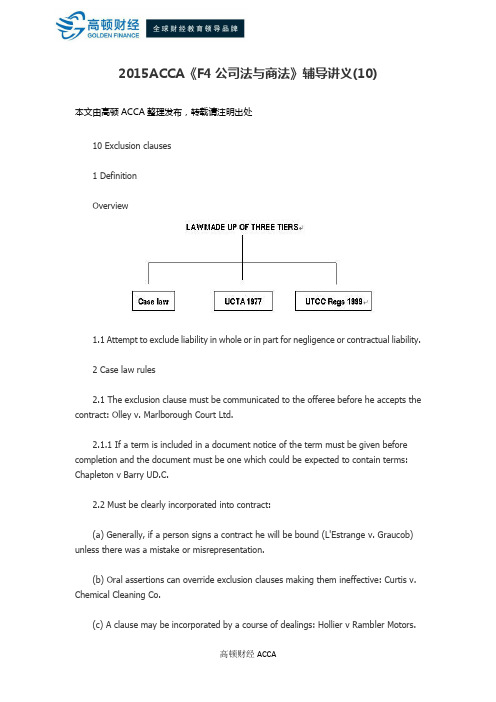
2015ACCA《F4公司法与商法》辅导讲义(10)本文由高顿ACCA整理发布,转载请注明出处10 Exclusion clauses1 DefinitionOverview1.1 Attempt to exclude liability in whole or in part for negligence or contractual liability.2 Case law rules2.1 The exclusion clause must be communicated to the offeree before he accepts the contract: Olley v. Marlborough Court Ltd.2.1.1 If a term is included in a document notice of the term must be given before completion and the document must be one which could be expected to contain terms: Chapleton v Barry UD.C.2.2 Must be clearly incorporated into contract:(a) Generally, if a person signs a contract he will be bound (L'Estrange v. Graucob) unless there was a mistake or misrepresentation.(b) Oral assertions can override exclusion clauses making them ineffective: Curtis v. Chemical Cleaning Co.(c) A clause may be incorporated by a course of dealings: Hollier v Rambler Motors.2.3 Where a term is particularly unusual and onerous it should be highlighted. Failure to do so may mean that the clause is not incorporated.2.4 Wording must be sufficient to exclude the liability in question:(a) Ambiguities will be construed against the party relying on them ‘contra proferentum rule’.(i) Court presumes a clause is not intended to defeat main purpose of contract.(ii) However a clause can be drafted specifically to exclude liability for a fundamental breach: Photo Productions v Securior Transport ltd.NB: Would now be subject to ‘reasonableness’ test.更多ACCA资讯请关注高顿ACCA官网:。
ACCA F4知识要点汇总(精简版)
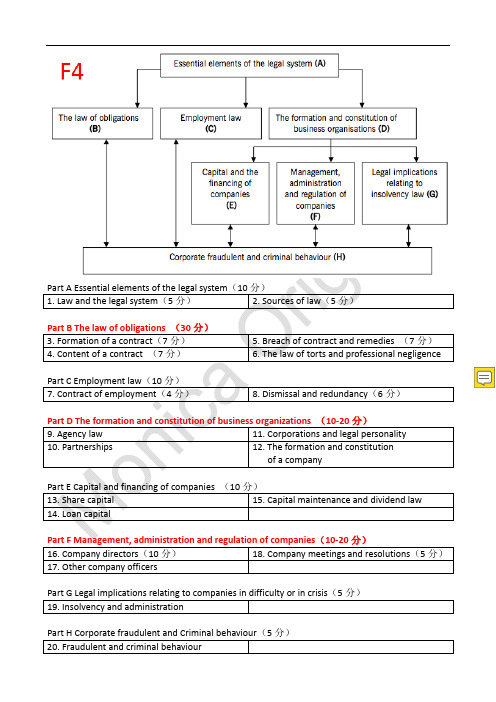
1. Law and the legal system(5 分)
2. Sources of law(5 分)
Part B The law of obligations (30 分) 3. Formation of a contract(7 分) 4. Content of a contract (7 分)
European Court of Human Rights (ECtHR) 欧洲人权法院
The Privy Council 枢密院
d) In the Factortamecase(欧洲移民法和商船法): 欧洲法 EU law>欧盟成员国国内法律。 所以,最高法院的有效性受到 EU law 判决的约束。
Magistrates 治安官法院、Crown court
offences
偷盗、吸毒、对他人实施暴力 皇冠法院都可以审理
上述两种皆可能
刑事诉讼操作:
Magistrates 治安官法院
a) Summary offences without a jury 轻微罪行(没有陪审团) b) Commit defendants charged with an indictable offence to the Crown
平衡可能性,谁的证据更占优 排除合理怀疑,疑罪从无
Decision 判决结果
Remedies 法律救济 Distinct courts of instance court 初审法 院
Judge 法官:Liable/Not liable 有 责任/无责任 Damages(损害赔偿金) Magistrates 治安官法院、County court 郡法院
- 1、下载文档前请自行甄别文档内容的完整性,平台不提供额外的编辑、内容补充、找答案等附加服务。
- 2、"仅部分预览"的文档,不可在线预览部分如存在完整性等问题,可反馈申请退款(可完整预览的文档不适用该条件!)。
- 3、如文档侵犯您的权益,请联系客服反馈,我们会尽快为您处理(人工客服工作时间:9:00-18:30)。
2015ACCA《F4公司法与商法》辅导讲义(2)
本文由高顿ACCA整理发布,转载请注明出处
1 Sources of law
(a) Common law
(b) Equity
(c) Statute (legislation) including delegated legislation
(d) European Union Law
2 Common law and equity
2.1 This is a system of law based upon decided cases. Legal rules (initially created by judges when hearing cases) are followed by judges in subsequent like cases.
It developed after the Norman Conquest.
2.2 Initially only common law rules were derived from cases. The aim of common law was certainty. However various problems within the common law system resulted in the development of another kind of case law called equity. Equity sought to address some of the problems contained in the common law system. Its aim is fairness.
2.3 Amongst the common law problems were inadequate remedies, a failure to recognise trusts and a reluctance to allow new causes of action to develop.
2.4 At first common law and equity operated as two distinct systems of law with their own independent court and judges. Given that equity is based on fairness however it was eventually decided that in the event of conflict between the two systems equity should prevail.
2.5 The two systems have now been merged together. In practice therefore, if you seek a remedy in the courts today, the court will look first to the common law. If the common law can deal with your problem adequately there will be no recourse to equity. If the common law is unable to deal adequately with the problem the court will look to equity.
2.6 Equity is therefore referred to as to a supplement to the common law.
2.7 The operation of equity is entirely discretionary whereas common law applies automatically.
2.8 Maxims:
'He who comes to equity must come with clean hands.'
'Equity does not suffer a wrong to be without a remedy.'
更多ACCA资讯请关注高顿ACCA官网:。
